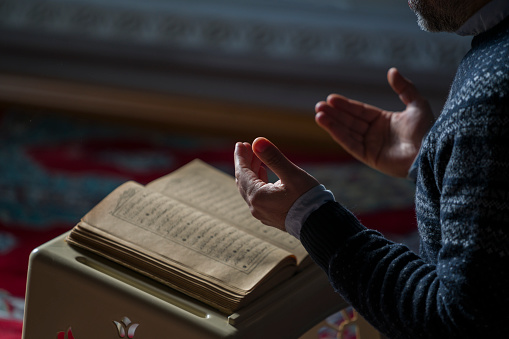Kapanlagi.com - Dhikr is one of the highly recommended practices in Islam. There are three readings recited during dhikr. One of them is istighfar, which is recited with the phrase "astaghfirullahaladzim". In addition to "astaghfirullahaladzim", there are other variations of istighfar readings, such as "astaghfirullah wa atubu ilaih". So, what is the meaning of astaghfirullah wa atubu ilaih?
Reciting istighfar is highly recommended to be done after prayer. Because, istighfar is believed to be one way to ask for forgiveness. By saying "astaghfirullahaladzim", a Muslim is asking for forgiveness from Allah SWT for all the mistakes made. Because, "astaghfirullah" means 'I seek forgiveness from Allah'.
Astaghfirullah wa atubu ilaih sounds longer than the usual istighfar reading. So what is the meaning of astaghfirullah wa atubu ilaih? To find out, read on below.
1. The Meaning of Astaghfirullah Wa Atubu Ilaih

(credit: unsplash)
As mentioned earlier, reciting istighfar in dhikr is a way for Muslims to seek forgiveness from Allah SWT. Astaghfirullah wa atubu ilaih is one variation of istighfar recitation. This means that the recitation can also serve the same purpose, which is to seek forgiveness.
Reciting istighfar can be one of the most effective ways to seek forgiveness. This is because when a Muslim recites istighfar, they not only ask for forgiveness but also acknowledge their mistakes with full awareness. That is why the meaning of astaghfirullah wa atubu ilaih can be very noble and important for every Muslim to know.
As previously explained, the phrase istighfar astaghfirullah means 'I seek forgiveness from Allah.' However, it is not uncommon for Muslims to recite istighfar with a longer phrase, which is astaghfirullah wa atubu ilaih. If translated, the meaning of astaghfirullah wa atubu ilaih is 'I seek forgiveness from Allah and I repent to Him.'
The meaning of the long and short istighfar recitations is actually not far apart. Both also mean the same thing, which is a request for forgiveness from Allah SWT. However, if we examine the meaning of astaghfirullah wa atubu ilaih, it feels deeper. This is because in its recitation, a Muslim declares that they will repent and promise not to repeat that sin again.
2. Recommendation to Recite Istighfar

(credit: unsplash)
Astaghfirullah wa atubu ilaih is one of the recitations that are recited during dhikr. This means that this recitation is very important. How not, by reciting astaghfirullah wa atubu ilaih regularly, all sins committed by Muslims can be forgiven and erased. However, not just reciting, of course, every Muslim must understand and practice the meaning of astaghfirullah wa atubu ilaih.
The recommendation to recite istighfar, especially with the recitation of astaghfirullah wa atubu ilaih, comes directly from Prophet Muhammad Rasulullah SAW. In one of his hadiths, Rasulullah SAW said:
"Whoever frequently seeks forgiveness, Allah will make for him a way out of every distress, and a relief from every anxiety, and will provide for him from where he did not expect."
In addition, in various occasions, scholars also often suggest Muslims to do dhikr by reciting istighfar. To make the dhikr and request for forgiveness perfect, it is recommended to recite istighfar 100 times a day.
3. The Virtue of Istighfar Recitation
As one of the important readings in dhikr, the meaning of astaghfirullah wa atubu ilaih has many virtues. Therefore, reciting astaghfirullah wa atubu ilaih is highly recommended, even up to 100 times a day, in order to obtain various virtues. Here are some virtues of the reading and meaning of astaghfirullah wa atubu ilaih.
1. Promised to receive forgiveness from Allah SWT, as stated in Surah An Nisa verse 110 which roughly means:
"And whoever does evil or wrongs himself but then seeks forgiveness from Allah, he will find Allah Forgiving and Merciful."
2. Promised to receive blessings from Allah SWT, as stated in a hadith that says:
"Blessed is the one whose record contains a lot of istighfar." (HR. Ibn Majah; authentic)
3. Will receive happiness from Allah SWT, as stated in a hadith that says:
"Whoever wants his record of deeds to be pleasing to him, let him increase his istighfar." (HR. Baihaqi; good)
4. Various Readings of Istighfar

(credit: unsplash)
Astaghfirullah wa atubu ilaih is only one of the readings of istighfar. Apart from that reading, there are several other readings of istighfar that can be recited by Muslims. So, besides the reading and meaning of astaghfirullah wa atubu ilaih, you also need to know the various readings. Here are some of the readings of istighfar.
1. Astaghfirullah hal adzim
Meaning: "I seek forgiveness from Allah the Almighty."
2. Subhaanallaahu wa bihamdihi, astaghfirullaaha wa atuubu ilaih.
Meaning: "Glory be to Allah, and praise be to Him. I seek forgiveness from Allah and repent to Him."
3. Allahumma maghfiratuka awsa'u min dzunuubi wa rahmatuka arjuu min 'amalii
Meaning: "O my Lord, Your forgiveness is truly wider than my sins and I hope for Your mercy more than my own deeds."
4. Rabbighfirlii wa tub 'alayya innaka antat tawwaabur rahiim
Meaning: "O my Lord, forgive me and accept my repentance. You are the Most Forgiving and the Most Merciful."
5. Subhanaka, allahumma wa bihamdika, asyhadu allaa ilaaha illaa anta, astaghfiruka, wa atuubu ilaika.
Meaning:
"Glory be to You, O Allah, and praise be to You. I bear witness that there is no god but You. I seek Your forgiveness and repent to You."
Those are some explanations of the meaning of astaghfirullah wa atubu ilaih and some other readings of istighfar. Hopefully, they can be useful and can increase your knowledge and faith as a Muslim. Amen.
(kpl/gen/psp)
Disclaimer: This translation from Bahasa Indonesia to English has been generated by Artificial Intelligence.















